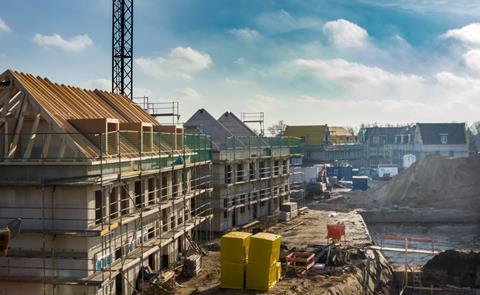Latest IHS Markit construction activity data paints gloomy picture across the board

Industry figures have expressed serious concerns about the state of the sector after the publication of the latest construction data, which shows activity slumping in September, falling at the second fastest rate in more than a decade.
Commercial activity led the decline, according to IHS Markit’s latest construction figures, followed by civil engineering, while housebuilding activity recorded a fourth successive monthly decrease.
The industry was “mired in a downturn” at the end of the third quarter, according to IHS Markit.
New work inflows fell substantially in September, while IHS Markit’s purchasing manager’s index recorded a score of 43.3 last month, down from the 45.0 mark posted in August.
Respondents to IHS Markit’s latest survey said the slowdown was being caused by “Brexit uncertainty and the resulting hesitancy caused among clients, as well as a general underlying weakness in demand”.
Despite the gloomy state of the sector IHS Markit said firms were “mildly optimistic” that output volumes would pick up in the coming 12 months.
But Mark Robinson, Scape Group chief executive, said the latest figures were “incredibly concerning”, and parallels between the slowdown in activity following the financial crisis and now could not be ignored.
“We are facing significant economic upheaval with no end to the uncertainty in sight and the construction sector is responding accordingly, with both public and private sector clients exercising caution.
“We desperately need clarity from the government on their legislative programme and detail on whether the EU is going to accept Boris’s proposed deal. Provide us with this clarity and businesses will finally be able to make decisions on projects that have been paused and pushed to the side.”
Brian Berry, chief executive of the Federation of Master Builders, said with the construction industry accounting for 7% of the UK’s GDP and more than 3m jobs, the latest figures “should be a concern for us all. With ambitious infrastructure and house building targets, the government can’t afford to lose any more capacity in this industry.”
“The PMI data picks up on material shortages and bottlenecks already, even before leaving the EU, and this is likely to be a major concern in the event of a no-deal. I urge the government to work with the industry to ensure that key construction products, critical to the building work this country needs, such as timber, are not held up at ports across the country in a no-deal scenario.”
The sector appeared to be continuing on a downward spiral, according to Jan Crosby, KPMG’s UK head of infrastructure, building and construction, with housebuilding’s slowdown a major concern.
“At the moment it feels like we have a mountain to climb to get back to full health, especially given activity is dropping at one of the sharpest rates since recession times.
“The poor performance in residential building is particularly discouraging. Given its status as the bellwether of the sector, its continued decline shows the strain the market is under.”
Andrew Symms, head of construction at law firm DWF, said IHS Markit/CIPS Construction figures for September were “pretty dark” and confirmed “the negative trend in the economy as a result of political uncertainties.
He said: “Given the continued tensions over Brexit, this is unlikely to change until Brexit is resolved and, even then, it is unclear the direction of the economy subsequently. Will there be pent up demand which will then be released or will there be a continuation of the negative trend?”










No comments yet